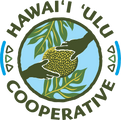Pilialoha Farms
Krista and Ala Savio of Pilialoha Farms grow ʻulu, kalo and medicinal lāʻau lapaʻau plants using organic methods. Their intention is to cultivate introspective spaces through agriculture to increase community health and foster relationships between people, culture, and ʻāina. As Ala takes their two young children on walks through the farm – observing and chanting to the plants – he says, “they might not pick up a shovel yet but they definitely have a role in this place.” In family and community alike, “we are doing this together, whatever ‘this’ is.”

In 2014, Krista and Ala started Pilialoha farms in the Kūhua ahupua‘a on 22 acres located between the Pāheʻeheʻe and Kolekole streams in Honomū. Ala says becoming a farmer “kinda just happened” when his kumu, Calvin Hoe, introduced him to loʻi kalo around 2003; since then, he has “never looked back.” While in recovery from addiction, Ala found that connecting to his Hawaiian culture – especially in the reflective space of traditional agriculture – helped him stay responsible to himself and the people of his community. “It was life saving for me,” Ala said, “I want to be able to help in the future, provide a space for that to happen to (other) people.” Joining Hakipuʻu Learning Center in Kāneʻohe as a kumu in the Moʻomona team’s Uka portion in 2004, Ala led students in agricultural education rooted in Hawaiian core values before deciding to start his own farm on the Big Island.

Planting the farm’s first ʻulu trees in the holes left behind by previous owners’ ornamental palms, Ala chooses traditional plants like ʻulu for their adapted hardiness and remediation of native soils. Krista, trained under Kahuna Lāʻau Lapaʻau Levon Ohai, uses select plants from the farm in her medicinal practice, with almost 20 years’ experience. Calling attention to the negative health disparities experienced by Native Hawaiians and Pacific Islanders in Hawaiʻi, Ala sees farming as an opportunity to affect community healing. “My experience is when we do things together we heal.” In both seeking help from and offering help to others and the ʻāina, Ala tends his relationships with people and plants as a continuous practice of healing. “I want help and I want to help, too. To me, being in community is helping each other.”

An HUC co-op member since 2019, Ala relates the cooperative community to healthy food for one’s body. The mutually supportive co-op relationship among farmers provides benefits like increased financial stability and resource sharing, giving growers the space to practice more sustainable methods. As Ala says, “feel better, do better.”
Check out Pilialoha Farms ʻUlu Poke recipe here, featuring all Hawaiʻi-grown ingredients.


Leave a comment
Please note, comments must be approved before they are published